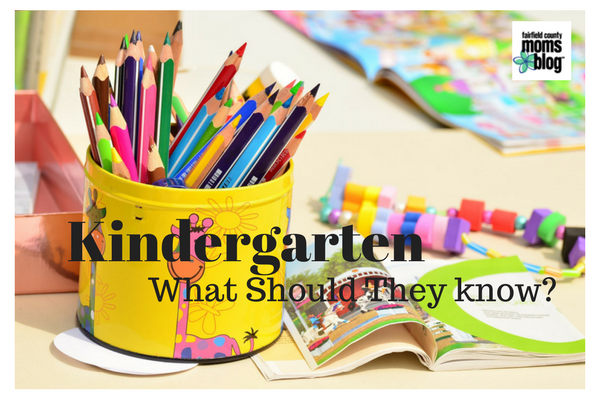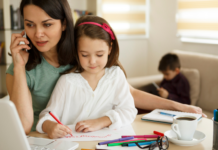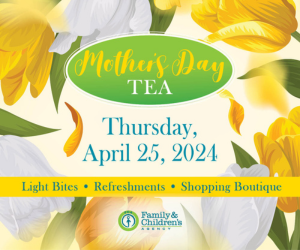As mothers, we understand one of the most critical components to our children’s young lives is their education. Since it’s time to ring in a new school year, the contributors at Fairfield County Moms Blog wanted to share some tips, tricks, and words of wisdom to help you through this exciting, yet stressful time. Be sure to keep a look out for our Education Series posts all this week!
 Kindergarten is a monumental life moment in any child (or parents) life! This is their first experience in a new school, and for most experiencing a full day of learning! Kindergarten is an emotional time, especially in the beginning of the year. There are many tears from children due to fear of the unknown or because of a new experience. There are also those children that thrive on new beginnings and relish in a new place with new friends and faces!
Kindergarten is a monumental life moment in any child (or parents) life! This is their first experience in a new school, and for most experiencing a full day of learning! Kindergarten is an emotional time, especially in the beginning of the year. There are many tears from children due to fear of the unknown or because of a new experience. There are also those children that thrive on new beginnings and relish in a new place with new friends and faces!
Kindergarten is also emotional for the parents! Trusting a teacher who you have met briefly with your precious child for 6-8 hours a day can be very emotional! It’s emotional for the teacher as well! I was a Kindergarten teacher for 10 years before becoming a stay at home mom and let me tell you, the first day (and week) are the most exhausting, overwhelming and emotionally draining days of the year.
Kindergarten is a very exciting and growth oriented year but unfortunately those gains keep getting pushed higher and higher. Children coming to Kindergarten at ages 4 and 5 are still so young! There are many things that they are being asked to do that are hard! There are many expectations on these young children to complete and succeed with by the end of the year. So now you ask what should my child really know going into Kindergarten….let me ease your mind!
Identify and Write Their First Name
Your child should be able to pick our their name on their new cubby, seat, supplies and around their classroom. I used this activity the first day of school. When parents arrived I would tell the child they needed to find their name around our room at least five times. Your child should also be able to write their name. Trust me, we’re not asking for lined paper and perfect penmanship, but letters that look relatively close their shape on a piece of paper. If they need an example to copy of their name, that is a great start!
Number Sense
Children should know how to rote count to at least 20. This is something easy to practice at home with many daily skills. Count the number of food items on their plate, how many fingers do you have, how many toys are there? These simple counting practices will help children understand that numbers have value and can be used to measure amounts. While practicing rote counting, show your child the number that corresponds with what they are saying to help strengthen their number identification skills as well. If they can do both, your child is ahead of the game!
Concepts of Print
A child entering kindergarten should know the basic parts of a picture book and how to “read” it. I don’t mean read the words on the page but simply know how to hold the book properly, turn the pages, text direction, beginning/ending of sentences. At this point a child should be able to use the pictures in a story to orally tell it as they see fit. For example if there is a dog chasing a boy, your child should be able to verbalize this and “tell” the story. If these are things that your child has mastered incorporate 1:1 correspondence into your daily story reading. Children need to be able to distinguish between letters and words. 1:1 correspondence is simply pointing to each word as you or your child reads. Have them count the words on the page (more counting practice!) or how many letters in a word!
Conversational Skills
This a huge skill that is VERY simple to do and practice at home. Children build conversational skills by simply talking to their parents, siblings, grandparents, peers, pets and whoever else they may come in contact with! This was part of our daily homework for students! They were required to read an appropriate level text (or have one read to them if they weren’t able) and to answer a question. Families were given a list of 10 questions each week to talk about their reading. While reading with your child at home, ask them questions about the story. Who is the story about? What is happening? Where is the story happening? Do you like this story and why? What was your favorite part? These are simple things that will build a child’s conversational skills and their vocabulary skills as well! You can also have a conversation about their day. I always told parents to ask their child what we did at school and the answer wasn’t nothing! Talk to your child and allow them to expand on their responses, not a simple yes or no.
Kindergarten may be scary at first for all but the growth that children make from the beginning to the end of the year is simply amazing. Their brains are sponges and they soak up everything! As a teacher you can tell when a child has got a skill because it’s almost as a light bulb has gone off in their head. The Aha moment has arrived! These moments are a great time to celebrate and congratulate the child because they have succeeded and they should be proud of their accomplishments!
Still need more info about starting Kindergarten? Check out these other great articles from our mama’s!
5 Things They Did NOT Tell You At Kindergarten Orientation
Kindergarten Redshirting – Is Your Child Ready?

























